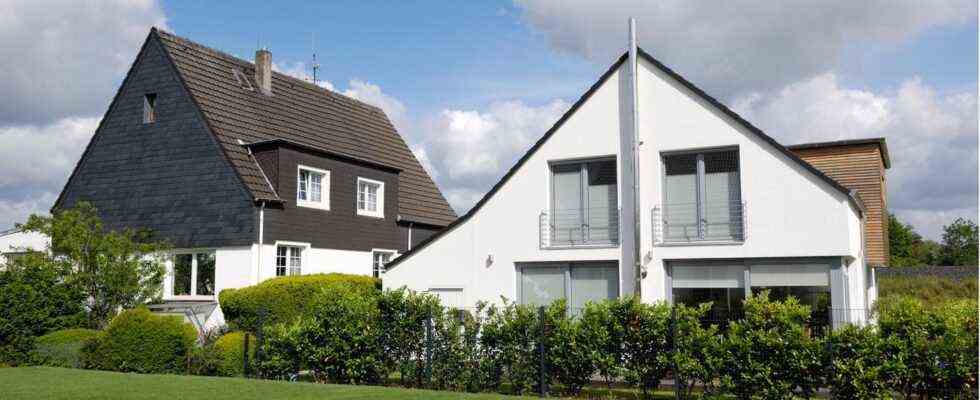Current evaluation
Where renting and buying is getting cheaper
The price boom currently seems to have stopped for home ownership
© acilo / Getty Images
Has the pain threshold been reached? Real estate experts see the rise in prices for rents and property nationwide almost stopped. In some cities it is currently even cheaper.
Many things are currently becoming significantly more expensive, but there are cautious signs of relaxation on the housing market: overall rents are hardly rising any more – and the rise in real estate prices has almost stopped. This is the result of an evaluation by the Hamburg F + B Institute, which analyzes the nationwide residential and real estate market.
The average new lease rents rose in the third quarter only minimally by 0.2 percent compared to the previous quarter. Condominiums were 0.9 percent more expensive, the prices of single-family homes remained unchanged. For the first time in many years, the German housing market appears to be calming down in both the rental and purchase segment, write the F + B experts. Compared to the previous year, the prices are a little higher, but far from previous record rates (see table).
Development of prices and rents in the third quarter
Change to the previous quarter | Change compared to the same quarter of the previous year | |
Single family homes | 0.0% | 3.1% |
Condominiums | 0.9% | 4.9% |
New contract rents | 0.2% | 1.6% |
Existing rents | 0.3% | 1.2% |
Source: F + B Wohn-Index 2021
Price drops in some cities
F + B names the no longer growing metropolises as a slowing factor. There, in particular, purchase prices have continued to explode over the past ten years, while rents have stagnated at a high level for some time. There are now indications that the rental and price rally of recent years in the big cities is over. “Whether this development will initiate the downturn phase expected by many cannot yet be predicted with certainty,” says F + B boss Bernd Leutner.
However, the impression is solidifying “that in many locations the ‘pain thresholds’ have been reached at the absolute level of the price level, at least for owner-occupiers without major assets,” writes F + B in its report. Some things are now too expensive for investors. General assumptions according to which “everything can be sold that is offered” are no longer tenable.
In some particularly expensive cities, F + B is even seeing price drops. In Munich, for example, condominiums were 1.4 percent cheaper in the third quarter than in the previous quarter and even 2.7 percent cheaper than a year ago. Nevertheless, with square meter prices averaging 7090 euros, Munich remains the most expensive city in Germany. In the expensive Munich suburbs of Germering and Olching, prices fell even more sharply, but all in all bacon belt communities around the metropolises are tending to be more expensive. A look at the big cities themselves shows that prices in Stuttgart and Düsseldorf have recently fallen somewhat. They rose slightly in Hamburg, Frankfurt, Berlin and Cologne. Overall, 16 of the 50 most expensive cities recorded lower prices for condominiums in the third quarter than in the previous quarter.
Real estate prices in the seven largest metropolises
city | Price per square meter * | Change compared to Previous quarter | Change compared to Quarter of the previous year |
Munich | 7090 euros | -1.4% | -2.7% |
Frankfurt | 5550 euros | 1.6% | 2.2% |
Hamburg | 5370 euros | 1.8% | 5.4% |
Stuttgart | 5210 euros | -0.2% | 2.8% |
Dusseldorf | 4390 euros | -0.3% | 2.1% |
Cologne | 4150 euros | 1.0% | 3.7% |
Berlin | 4120 euros | 0.6% | 3.0% |
* for 75 sqm standard apartment; Source: F + B Wohn-Index 2021
F + B also sees some relaxation in the rents in the big cities. In 23 of the 50 most expensive cities, new contract rents fell in the past quarter, including Frankfurt, Freiburg, Tübingen and Ingolstadt. F + B had actually expected that many landlords would want to get everything out of new lettings shortly before the federal election before a new government possibly passed stricter regulation.
With the FDP in the future government that will probably not exist anyway. In the current traffic light negotiations, it is likely that in the end only existing tenant protection rules will be extended. In addition, the traffic light parties will probably be able to agree on a program for more new residential construction.


